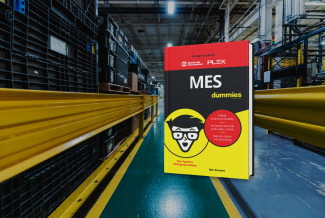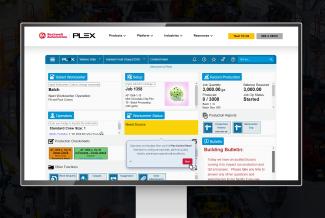Food Manufacturing Software: Why MES Is Critical for Food and Beverage Manufacturers
Learn why MES is critical for manufacturing in the food and beverage industry, and how Plex can optimize your plant floor.
The food and beverage industry is highly competitive and demanding for manufacturing teams. Compliance challenges like meeting food safety standards, expiry date tracking, and recipe handling, in addition to the usual manufacturing processes can make it difficult for companies to manage operations effectively.
For businesses, keeping up with the latest food manufacturing software seems expensive and daunting. However, integrating a fit-for-purpose manufacturing execution system (MES) could be a positive change for companies of all sizes. An MES is an end-to-end digital solution that could help manage all aspects of your business.
Integrating new technology into your company’s operations should always be handled carefully. We have put together an extensive guide on why an MES solution is critical for food and beverage manufacturers and how to integrate a system safely and efficiently.
MES For Food and Beverage Explained
An MES system will help food and beverage manufacturers manage all the different processes on the shop floor, this includes quality compliance, productivity, scheduling, and shipping. The software is integrated within a manufacturing facility and provides a centralized view of operations, making it easy for workers to identify issues in real-time and make proactive changes to ensure minimal disruption. Manufacturing teams using an MES can stay ahead of the curve, running operations smoothly and strategically.
How can MES Optimize a Shop Floor?
Food manufacturing software like an MES can do more for manufacturing companies than a traditional pen-and-paper approach that requires businesses to manually pull data, and deal with issues after the fact.
Integrating an MES system with your current manufacturing systems and processes can provide the following benefits:
- Acceleration of Production: MES collects information on all orders, batches, work centers, delivery, and other core processes to streamline the production flow.
- Increases Efficiency: Production efficiency software like an MES records details of personnel, such as the tasks that are assigned, total working time, and resource management. This improves efficiency throughout the entire shop floor.
- Ensures Compliance & Best Practice: MES ensures compliance, and all best practices are met with the ability to track recipes, expiry dates and other manufacturing instructions. It also guarantees everyone is working towards the same end goals, using the same training documents, health & safety procedures, and workflows.
- Improved Visibility: Integrating an MES system will display the status of machinery, resources, and personnel in real-time. This allows managers to take corrective action for improvement before any costly issues occur.
- Builds a Reputation of Trust and Quality: End-to-end visibility of your production process helps manufacturers ensure the best possible quality in products and services, building a reputation of trust and quality with the supplier base using reliable data.
- Reduces Costs: Identifying potential faults or issues before they become a problem makes predictive maintenance possible. This can protect manufacturers against costly downtime or mistakes. Increased efficiency in task management and resources reduces outgoings and improves profitability.
- Ensures Data Security: Important information collected by MES systems is kept securely and can only be viewed by intended authorities with access rights.
Ready to take control of your production process?
See exactly how Plex MES helps food and beverage manufacturers ensure compliance, perform quality checks, and track products in this on-demand demo.
Food Manufacturing Software – How Does MES Differ From ERP?
MES can easily integrate with your existing systems. ERP is often used as food processing software and is also commonly used in the industry. It’s useful to understand the difference between MES and ERP and how they can work together.
ERP and MES both fall under the same umbrella. ERP is used to map an entire supply chain using information from production, inventory, sales, purchase, quality control, research, and development.
Using an MES and ERP together integrates data across multiple management functions. These functions include customer service, order processing, and financing with manufacturing data that comes from production scheduling, machine throughput and inventory changes. This allows you to monitor all core processes in one place and provides your management team with transparency that disparate processes ordinarily could not capture.
If you want more information about MES, you can learn about the 11 core functions, system architecture and find additional resources in our Beginners Guide to MES.
With the help of MES technology, a food and beverage company that supplies the fast-food industry saw their inventory accuracy rise from 70% to 99.6%, allowing them to achieve compliance with customer scorecards quickly. You can learn more about a Plex, by Rockwell Automation manufacturing execution system (MES) and how it can help you take control of your plant floor here.
MES Solutions for Food and Beverage Manufacturers
MES can be an even more powerful solution for your businesses when the plant floor is connected to the top floor. After all, you’re running a business, so you need a system that supports your profit centers with operational data to provide greater visibility for the whole organization. MES in the cloud provides a more modern, future-proof IT infrastructure with increased uptime and deployment flexibility while off-loading security and access controls, system support and maintenance, and hardware costs to a SaaS provider. The control and visibility that it enables makes production decision-making more effective.
Learn More



